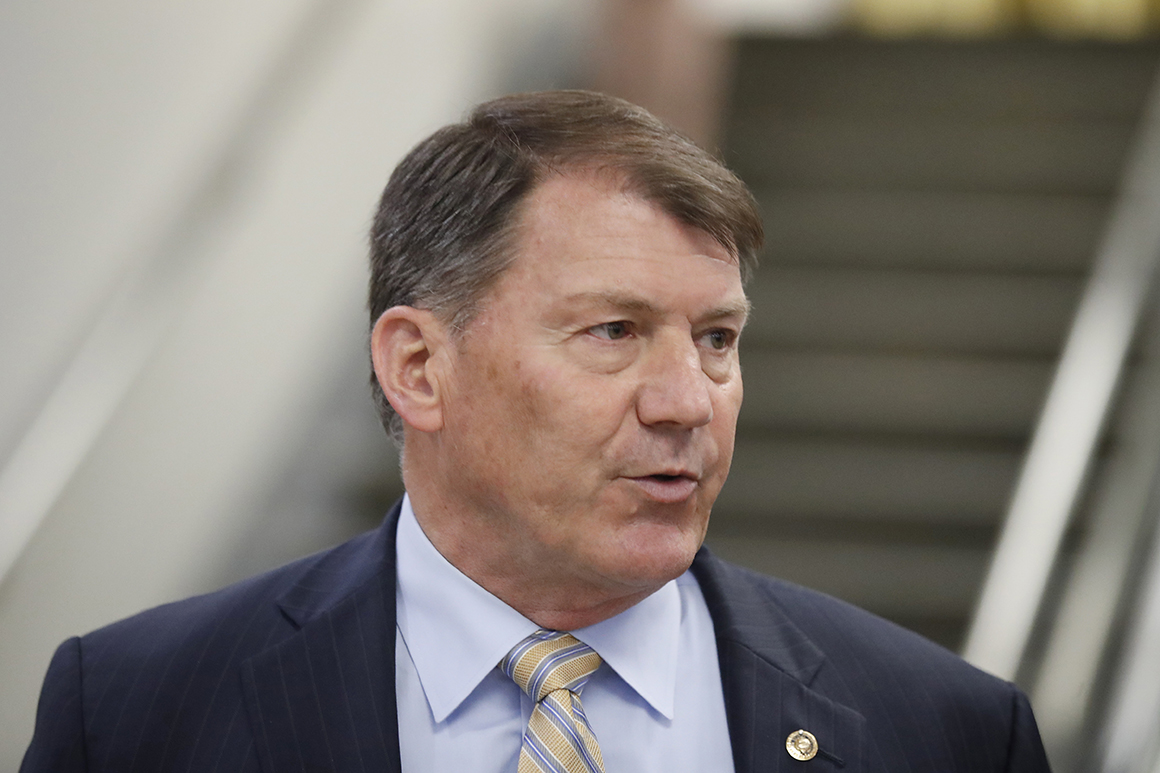Senate Republicans were unfazed Wednesday by President Donald Trump’s threat to veto the annual defense policy bill over his opposition to the renaming of U.S. military installations honoring prominent Confederate figures.
The reactions from GOP senators reflected a political reality this week as the Senate prepares to pass the National Defense Authorization Act: That the provision is unlikely to be stripped from the final bill to placate the president.
“It was expected,” Sen. Mike Rounds (R-S.D.), an Armed Services Committee member who was supportive of the proposal to rename bases, said of Trump’s veto threat. “You always want to be able to show your support for our military men and women, and that’s what this is about — providing protection for them.”
In fact, most Republican senators said they had no problem at all with Sen. Elizabeth Warren’s (D-Mass.) amendment, and they said Trump should not veto a bill as vital as the National Defense Authorization Act over minor objections.
“The NDAA is so important and there are so many important elements in it that I don’t believe that alone should be a reason to even vote against it or veto it,” Sen. Marco Rubio (R-Fla.) said.
“Ultimately, I don’t think the name of a facility should be something that’s divisive or offensive to people, especially if there are better alternatives to it,” Rubio added. “But it has to be through a process — a considered process.”
Senate Armed Services Committee Chairman Jim Inhofe (R-Okla.) acknowledged that it might be difficult to work through the amendment process on the behemoth yearly bill, but he noted that it would be several months before the legislation actually reaches Trump’s desk, during which time it could be changed as a result of negotiations between the Senate and House.
“The veto would take place sometime probably in November,” Inhofe said. “And we have a long, long time between now and November. So we’ll see.”
The blasé responses from Senate Republicans followed a midnight tweet from the president in which he said he would veto the defense bill unless the Senate scrubs an amendment from Warren that requires the Pentagon to remove the names of Confederate military figures from all U.S. bases, aircraft and other facilities and equipment within three years.
It’s highly unlikely that Warren’s amendment will be removed from the legislation; it would take 60 votes on the Senate floor to get rid of it. And even if Trump were to veto the bill, it is expected to pass with a veto-proof majority in both chambers.

The amendment was approved by the GOP-led Senate Armed Services Committee in June during a closed-door markup. Several Republicans have since spoken out in support of the plan, despite Trump’s long-standing opposition to eliminating Confederate names from military bases.
“We knew that there was a possibility to begin with, and it’ll still continue to be a part of the question,” Rounds said of Trump’s veto threat.
The move to rename bases also comes as America faces a reckoning over racial injustice, generated in part by the killing of George Floyd, an unarmed Black man, by police in Minneapolis and subsequent nationwide protests over police brutality.
Sen. Josh Hawley (R-Mo.) introduced an amendment to the defense bill that would instead create a commission to address the issue of whether to rename the military bases. The amendment has support from a variety of Republicans, including Rounds. The amendment would need 60 votes on the floor to pass.
“I think a vote on that would solve this problem,” Hawley said.
Warren, like other Democrats, predicted that her provision will remain in the final bill, due at least in part to the 60-vote threshold.
“The decision to remove the names of Confederate generals who took up arms against the United States in defense of slavery was a bipartisan decision that came out of the committee, and it’s going to stay in the defense budget,” Warren said Wednesday in a brief interview. “The president can do what he wants, but it stays.”
Trump’s veto threat came after White House press secretary Kayleigh McEnany in early June called the amendment an “absolute nonstarter” for the president. Defense Secretary Mark Esper and Secretary of the Army Ryan McCarthy initially expressed an openness to renaming bases named after Confederate figures — only to face opposition from Trump.
Senate Majority Leader Mitch McConnell (R-Ky.) declined to weigh in on Trump’s veto threat Wednesday, but he has previously signaled support for the renaming effort.
“If It’s appropriate to take another look at these names, I’m personally OK with that — and I am a descendant of a Confederate veteran myself,” McConnell said last month. “With regard to military bases, whatever is ultimately decided, I don’t have a problem with.”
Senate Democrats, meanwhile, predicted on Wednesday that Trump would not actually veto the bill over his objections to Warren’s amendment, noting that the legislation includes a pay raise for American service members and other priorities of the White House.
“This is typical bluster from President Trump,” said Senate Minority Leader Chuck Schumer (D-N.Y.), who dared the president to veto the measure on Tuesday. “The NDAA will pass and we will scrub from our military bases the names of men who fought for the Confederacy and took up arms against our country.”
Some GOP senators, though, agree with the president on the preservation of Confederate bases. Sen. John Kennedy (R-La.), for example, introduced an amendment to the defense bill that would rename all U.S. military bases after Medal of Honor winners.
“If we’re going to do this fairly, we should reevaluate all bases,” Kennedy said.
Source: politico.com
See more here: news365.stream






